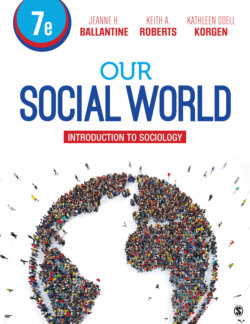Читать книгу Our Social World - Kathleen Odell Korgen - Страница 165
На сайте Литреса книга снята с продажи.
Micro-Level Socialization
ОглавлениеPerhaps the most important micro-level formal agent of socialization is our own family—parents, siblings, and other family members. One way in which families teach children what is right and wrong is through rewards and punishments, called sanctions. Children who lie to their parents may receive a verbal reprimand or a slap on the hand, be sent to their rooms, have a “time out,” or receive a spanking, depending on differences in child-rearing practices among families. These are examples of negative sanctions. Conversely, children may be rewarded for good behavior with a positive sanction, such as a smile, praise, a cookie, or a special event. The number and types of sanctions dispensed in the family shape the socialization process, including development of the self and the perceptions we have of who we are and even whether we are good and clever or bad and stupid. Note that family influence varies from one culture to another.
In Japan, the mother is a key agent in the process of turning a newborn into a member of the group, passing on the strong group standards and expectations of family, neighbors, community, and society through the use of language and emotion. The child learns the importance of depending on the group and therefore fears being cast out. The need to belong creates pressure to conform to expectations, and the use of threats and the fear of shame help socialize children into Japanese ways (Brinkerhoff et al. 2014; Hendry 1987). The social class of the mother and gender of the child affects the socialization experience provided by the mother; for example, many women see their daughters as caregivers of the family in the future, thus influencing the daughters’ type of education and educational attainment (Yamamoto 2015).
Nonconformity is a source of shame in Japan. The resulting ridicule is a powerful means of social control. In some cases, the outcast is physically punished by peers. Thus, to bring shame on oneself or the family is behavior to be avoided. In the most extreme cases, young people have committed suicide because they did not conform to group expectations or succeed in school or a job and felt profoundly ashamed as a result.
▲ A Japanese mother helps her son at Heian Shinto Shrine during Shichi-go-san Matsuri, also called the Seven-Five-Three Festival, a celebration with prayers of long life for children aged 3 to 7.
© Getty Images/Tibor Bognar/Corbis Documentary
Thinking Sociologically
How did agents of socialization influence who you are today, and how did your experience differ from that of the Japanese children just described?
In contrast to the values of conformity and fitting into the group espoused in many Asian countries, in the United States most parents teach their children to value friendliness, cooperation, orientation toward achievement, social competence, responsibility, and independence. However, subcultural values and socialization practices may differ within the diverse groups in the U.S. population. Conceptions of what makes a “good person” or a “good citizen” and varied goals of socialization bring about differences in the process of socialization around the world.
